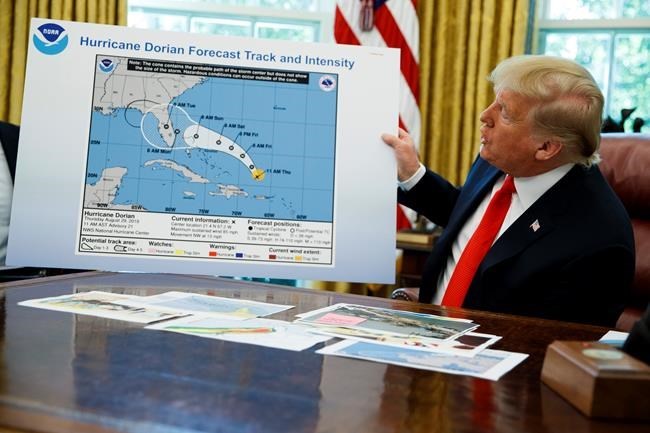
FILE - In this Wednesday, Sept. 4, 2019 file photo, President Donald Trump holds a chart as he talks with reporters after receiving a briefing on Hurricane Dorian in the Oval Office of the White House in Washington. A report from the National Academy of Public Administration released on Monday, June 15, 2020 says that NOAA’s acting chief Neil Jacobs and its then-communications director, Julie Kay Roberts, twice breached the agency’s rules designed to protect scientists and their work from political interference, putting out a press statement that “did not follow NOAA’s normal proves and appear to be the result of strong external pressure.” (AP Photo/Evan Vucci)
June 16, 2020 - 11:19 AM
National Oceanic and Atmospheric Administration leaders violated the agency’s scientific integrity when they chastised a local weather office that had contradicted President Trump’s inaccurate comments about Hurricane Dorian, an outside panel found.
NOAA’s acting chief, Neil Jacobs, and its then-communications director, Julie Kay Roberts, twice breached the agency’s rules designed to protect scientists and their work from political interference, the National Academy of Public Administration concluded. Jacobs and Roberts released a statement that “did not follow NOAA’s normal process and appear to be the result of strong external pressure,” the group wrote in the 144-page report released late Monday.
NOAA’s science department had asked the public administration group to look into several complaints, including from its chief scientist and past administrator, after Hurricane Dorian threatened the East Coast in September.
As the storm approached the U.S., Trump tweeted that Alabama, along with the Carolinas and Georgia “will most likely be hit (much) harder than anticipated,” even though the National Hurricane Center had pretty much said Dorian would not hit Alabama. He later defended his statements with a crude Sharpie-drawn addition to a forecast map.
Twenty minutes after Trump's tweet, meteorologists in the National Weather Service’s Birmingham office tweeted “Alabama will NOT see any impacts" from the storm.
After a phone call to Jacobs from his boss, Commerce Secretary Wilbur Ross, and other conversations with Commerce Department political appointees, NOAA put out the statement chastising the Birmingham weather office tweet. The statement said the Alabama office “spoke in absolute terms that were inconsistent with probabilities from the best forecast products available at the time.”
Dorian made landfall in North Carolina and had no major impact on Alabama, which is about 600 miles away.
The outside report said the violations of scientific policy were, first, issuing the statement without talking to the Birmingham meteorologists and, second, issuing it after political pressure.
No one was disciplined, and Jacobs and Roberts disputed the findings. Roberts left NOAA for another high-ranking job in the Department of Commerce.
In a response letter, NOAA’s acting chief scientist, Craig McLean, criticized the lack of discipline against the two.
“While there may be found causes of sympathy for the oppressed and meek subordinates of domineering autocratic ogres, I hardly can find sympathy in this scintilla of an argument for clemency,” McLean wrote in a response letter. “If not the single highest person in NOAA, who will stand for the Scientific Integrity of the agency and the trust our public needs to invest in our scientific process and products? The NOAA Administrator? The NOAA Director of Communications?”
In a statement Tuesday, Jacobs called the report “an overly broad interpretation" and faulted it for creating "new standards for scientific misconduct.” He said NOAA’s unsigned statement in September “was not intended to imply Birmingham did anything wrong.”
Other investigations, including an inspector general report, are still pending.
___
AP writer Meghan Hoyer contributed to this report.
News from © The Associated Press, 2020